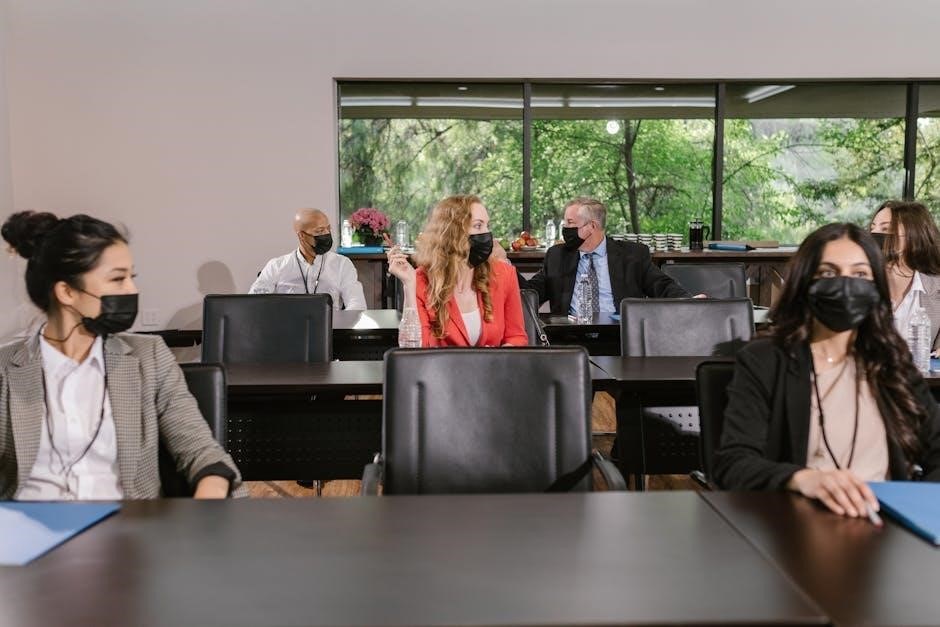Lifeguard test questions and answers PDFs provide essential resources for certification preparation‚ offering practice exams‚ scenario-based queries‚ and comprehensive study guides to master lifeguarding skills effectively.
Overview of Lifeguard Certification Tests
Lifeguard certification tests assess candidates’ knowledge and skills in water rescue‚ first aid‚ and emergency response. These exams typically include multiple-choice questions‚ scenario-based problems‚ and practical demonstrations. They evaluate understanding of lifeguarding techniques‚ safety protocols‚ and critical thinking. Certification tests are offered by organizations like the Red Cross and YMCA‚ ensuring standardized training. The exams cover topics such as CPR‚ water rescue methods‚ and risk management. Passing these tests confirms a candidate’s readiness to respond effectively in aquatic emergencies‚ emphasizing both theoretical knowledge and practical proficiency.
Importance of Practice Tests for Lifeguard Exams
Practice tests are crucial for lifeguard exam success‚ allowing candidates to assess their readiness and identify knowledge gaps. They simulate real exam conditions‚ helping build confidence and time management skills. By tackling sample questions‚ individuals can familiarize themselves with test formats and content‚ improving their ability to respond accurately under pressure. Regular practice also reinforces key concepts‚ such as water rescue techniques and emergency response protocols‚ ensuring a solid foundation for performing effectively in actual lifeguarding scenarios and passing the certification exam.
Benefits of Using PDF Resources for Test Preparation
PDF resources offer a convenient and accessible way to prepare for lifeguard exams. They provide comprehensive practice tests‚ study guides‚ and detailed answers‚ allowing candidates to review material offline. PDFs are portable‚ enabling study anywhere‚ and often include realistic scenarios and multiple-choice questions. They help candidates familiarize themselves with exam formats‚ identify weak areas‚ and reinforce critical skills like CPR and water rescue techniques. Accessing these resources ensures thorough preparation and confidence for lifeguard certification tests.

Types of Questions in Lifeguard Tests
Lifeguard tests feature multiple-choice‚ true/false‚ fill-in-the-blank‚ scenario-based‚ and open-ended questions to assess knowledge‚ critical thinking‚ and emergency response skills in a structured format.
Multiple-Choice Questions (MCQs) in Lifeguard Exams
Multiple-choice questions (MCQs) are a common feature in lifeguard exams‚ testing candidates’ knowledge on various topics. These questions present several answer options‚ requiring the correct choice. MCQs cover areas like CPR techniques‚ water rescue methods‚ and emergency protocols. They assess the ability to apply theoretical knowledge to practical scenarios. Often‚ MCQs are time-efficient and straightforward‚ making them ideal for evaluating a broad range of skills. Proper study using PDF resources helps candidates master these questions‚ ensuring readiness for the exam.
True/False and Fill-in-the-Blank Questions
True/False and fill-in-the-blank questions in lifeguard exams assess specific knowledge and recall. True/False questions test understanding of facts‚ while fill-in-the-blank requires precise terminology. These formats ensure accuracy and clarity‚ preparing lifeguards for real-life scenarios. PDF resources provide practice with these question types‚ enhancing exam readiness and confidence in critical situations.
Scenario-Based Questions for Emergency Response
Scenario-based questions simulate real-life emergencies‚ testing a lifeguard’s ability to apply knowledge in critical situations. These questions present specific incidents‚ requiring candidates to outline appropriate responses. PDF guides offer detailed examples‚ such as drowning scenarios or cardiac arrests‚ ensuring lifeguards can think and act effectively under pressure. Practicing these questions enhances decision-making skills‚ ensuring preparedness for emergencies and aligning with certification standards.
Open-Ended Questions for Critical Thinking
Open-ended questions in lifeguard tests require detailed explanations‚ assessing critical thinking and problem-solving skills. These questions often present complex scenarios‚ asking candidates to explain their approach to emergencies‚ such as multi-victim rescues or spinal injuries. They evaluate the ability to articulate clear‚ logical responses‚ ensuring lifeguards can justify their actions in high-pressure situations. Practice tests in PDF formats include these questions‚ helping candidates refine their reasoning and communication skills‚ essential for real-world decision-making and certification success.

Key Topics Covered in Lifeguard Test Questions
Lifeguard test questions cover essential topics like CPR‚ water rescue techniques‚ emergency response‚ and prevention strategies‚ ensuring comprehensive preparation for real-world scenarios and certification requirements.
CPR and First Aid Procedures in Lifeguarding
Lifeguard tests emphasize CPR and first aid as critical skills for emergency response. Questions cover chest compressions‚ ventilation techniques‚ and proper hand placement. First aid procedures include wound care‚ burn management‚ and fracture stabilization. Lifeguards must know how to assess injuries and provide appropriate care. Understanding when to use automated external defibrillators (AEDs) is also essential. Additionally‚ scenarios involving bleeding control and splinting are commonly tested. Proficiency in these areas ensures lifeguards can respond effectively to medical emergencies‚ making them vital components of the certification process.
Water Rescue Techniques and Safety Protocols
Water rescue techniques are a cornerstone of lifeguard certification‚ with questions focusing on identifying early warning signs of distress and executing safe rescues. Lifeguards must master active and passive victim approaches‚ proper use of flotation devices‚ and swimming techniques to minimize risk. Safety protocols emphasize assessing the situation before entering the water and using the buddy system. Questions also cover post-rescue care‚ such as stabilizing the victim and providing CPR if necessary. Proficiency in these methods ensures effective and safe water rescues‚ critical for preventing fatalities in aquatic environments;
Emergency Response and Lifesaving Skills
Emergency response and lifesaving skills are critical components of lifeguard certification. Questions focus on rapid assessment‚ prioritization‚ and execution of appropriate actions in high-pressure scenarios. Lifeguards must demonstrate proficiency in CPR‚ use of automated external defibrillators (AEDs)‚ and proper ventilation techniques with bag-valve-mask (BVM) devices. Scenarios involving multiple victims or catastrophic incidents test decision-making and adherence to protocols. Mastery of these skills ensures timely and effective responses‚ minimizing risks and improving outcomes in life-threatening situations. Practical application of these techniques is heavily emphasized in certification exams.
Prevention and Risk Management Strategies
Prevention and risk management are cornerstone skills for lifeguards‚ tested through scenario-based questions. These questions assess the ability to identify early warning signs of distress‚ implement safety protocols‚ and educate patrons on hazard prevention. Strategies include enforcing facility rules‚ monitoring high-risk areas‚ and educating swimmers about safety practices. Effective risk management reduces incident likelihood and ensures a safer environment. Lifeguards must demonstrate proactive approaches to preventing accidents‚ such as recognizing hazardous conditions and taking corrective actions promptly. These skills are critical for maintaining a secure and vigilant lifeguarding environment.

Preparing for the Lifeguard Certification Test
Master lifeguarding skills through consistent study‚ practice tests‚ and PDF guides. Focus on understanding emergency response techniques‚ CPR procedures‚ and water rescue strategies to build confidence and competence.
Study Tips for Mastering Test Questions
Utilize lifeguard test questions and answers PDFs to enhance your study routine. Focus on understanding key concepts‚ such as CPR techniques and water rescue protocols‚ by reviewing practice exams. Break down complex topics into manageable sections and use flashcards for quick revision. Regularly test your knowledge with sample questions to identify weak areas and improve retention. Consistent practice ensures a thorough grasp of lifeguarding procedures‚ boosting confidence for the certification exam.
Time Management Strategies for the Exam
Effective time management is crucial during lifeguard certification exams. Skim through all questions first to identify easier ones and allocate time wisely. Allocate 1-2 minutes per question‚ depending on complexity. Answer straightforward questions immediately‚ then return to challenging ones. Avoid spending too long on a single query. Use the process of elimination for multiple-choice questions. Review your answers if time permits. Prioritize questions covering key areas like CPR‚ water rescue‚ and emergency response. Practice with timed mock exams to build speed and accuracy‚ ensuring you complete the test within the allotted time.
Common Mistakes to Avoid During the Test
Common mistakes during lifeguard certification exams include rushing through questions without reading them carefully‚ leading to misinterpretation. Overthinking or second-guessing answers can waste time and reduce confidence. Neglecting to review questions or skipping difficult ones may result in incomplete answers. Forgetting key procedures‚ such as CPR steps or rescue techniques‚ can lead to incorrect responses. Additionally‚ guessing without eliminating wrong options lowers accuracy. To avoid these errors‚ practice time management‚ stay calm‚ and review answers if time allows. Familiarize yourself with common exam pitfalls to improve performance.

Red Cross and YMCA Lifeguard Test Questions
Red Cross and YMCA lifeguard test questions and answers PDFs offer real exam questions‚ verified solutions‚ and updated content for effective preparation and skill assessment.
Red Cross Lifeguard Test Format and Content
The Red Cross lifeguard test includes multiple-choice questions‚ scenario-based queries‚ and practical assessments. The exam covers CPR‚ water rescue‚ and emergency response techniques. A focus is placed on real-life applications‚ ensuring candidates demonstrate both knowledge and skills. Time management is crucial‚ as the test evaluates quick decision-making under pressure. Study materials‚ such as PDF guides‚ provide detailed insights into test formats and content‚ helping candidates prepare effectively for certification. Mastery of these elements ensures lifeguards are ready to respond confidently in critical situations.
YMCA Lifeguard Test Questions and Answers
YMCA lifeguard test questions and answers provide comprehensive preparation for certification. The exams include multiple-choice‚ true/false‚ and scenario-based queries‚ focusing on emergency responses‚ first aid‚ and water safety. Topics cover identifying early warning signs of distress‚ treating overheated guests‚ and proper rescue techniques. The tests emphasize practical applications‚ ensuring lifeguards are equipped to handle real-life situations. PDF resources offer detailed answers‚ enabling candidates to review and master the material effectively. Regular practice with these questions helps build confidence and competence for the certification exam.
Comparing Red Cross and YMCA Test Requirements
Red Cross and YMCA lifeguard certification tests share similarities but differ in focus. Both include multiple-choice and scenario-based questions‚ emphasizing emergency response and water safety. Red Cross tests often prioritize prevention and risk management‚ while YMCA exams may incorporate community engagement and pool operations. Certification periods also vary‚ with Red Cross valid for two years and YMCA for three. Understanding these differences ensures candidates prepare effectively for their chosen certification. Both organizations provide detailed study guides and practice exams in PDF formats to aid preparation and ensure readiness for the respective tests.

Final Tips for Success
Stay calm‚ practice consistently‚ and use PDF guides effectively. Regularly review sample questions and focus on weak areas to ensure confidence and mastery of lifeguarding skills.
How to Stay Calm and Focused During the Exam
To stay calm and focused during the lifeguard certification exam‚ practice deep breathing exercises and positive visualization. Skim through the test to identify easy questions first‚ managing your time effectively. Avoid rushing and ensure you read each question carefully. Use the process of elimination for unclear answers and review your responses if time permits. Maintain confidence by recalling your preparation and stay hydrated to keep your mind sharp throughout the exam.
Using Online Resources and PDF Guides Effectively
Utilize online resources and PDF guides to enhance your lifeguard test preparation. Download practice tests from reliable sources like Docsity for Red Cross and YMCA exams. Review sample questions and answers to familiarize yourself with the exam format. Focus on understanding scenarios‚ multiple-choice queries‚ and critical thinking prompts. Use study guides to strengthen weak areas and improve time management. Simulate exam conditions while practicing to build confidence and ensure readiness for the actual test.

Practicing with Sample Questions and Answers
Practicing with sample questions and answers is crucial for lifeguard certification success. These resources mimic real exam formats‚ helping candidates gauge their readiness. Use Red Cross and YMCA test questions to familiarize yourself with topics like water rescue techniques and emergency response. Reviewing answers improves understanding and highlights areas needing more study. Regularly simulating exam conditions ensures confidence and readiness‚ while timed sessions enhance time management skills. This methodical approach ensures thorough preparation for both theoretical and practical aspects of lifeguarding exams.
Summarizing Key Points for Test Preparation
Effective preparation for lifeguard certification involves understanding question formats‚ such as multiple-choice‚ true/false‚ and scenario-based queries. Regular practice with PDF resources enhances familiarity with exam content and timing. Focus on mastering CPR procedures‚ water rescue techniques‚ and emergency response skills. Develop strategies for time management and avoid common errors. Utilize online guides and sample questions to reinforce knowledge. Staying calm and focused during the exam is crucial for success. Consistent practice and thorough review ensure readiness for lifeguard certification tests.



